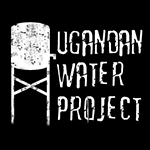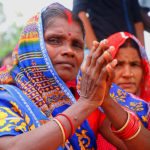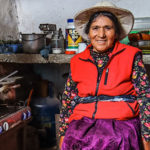
UGANDA
John SSentamu, a teacher in Uganda, invited the Waterbearers to visit and help his village celebrate World Water Day. In March 2019, we met John at the Good Shepherd Primary school in Katwadde. John has been able to add classrooms, one at a time, from personally solicited donations, and now 400 children pack this tiny school. Although they have piped water from the local municipality, it is metered and not always available during the day when children are present; furthermore, they don’t have enough money to pay for it!
Three months later in June 2019, The Waterbearers funded a rain catchment system that was installed in Katwadde. The 10,000-liter tank and gutter system was installed by the Ugandan Water Project. This system will provide the school and the community with safe drinking water 30 years or more.
In the village of Kakoni, we accompanied a woman to the well to fetch water. She carried a 5-gallon (20 liters) plastic jerry can, which weighs 40lbs when full. The walk through the bush takes over an hour round trip. On the way, we passed a borehole and a pump, which had long since dried up and was inoperable. Finally, we arrived at a large hand-dug hole in the ground with a rickety ladder leading down the steep bank to the surface of the well. The water, Kakoni’s only source, was a creamy brown color. It was the task of the women to make this journey several times a day and often at dusk without a flashlight. We were told that children no longer accompany their mothers to the well since a small boy fell into the water and drowned.
Currently, a pipeline is being extended approximately 2 kilometers to supply the village with access to municipal water. While 1 kilometer has already been completed, additional funds will enable them to reach the remaining 120 households. The Waterbearers provide the materials and installation, and the villagers excavate the ditches.
In both villages, the women told us that men often prey on young girls while they fetch water. It is not only important to have safe water, but also that women and girls are safe. The Waterbearers donated solar lanterns as a layer of protection they wouldn’t normally have.
The results were overwhelmingly favorable for our water filter systems. Although the women and children still need to walk long distances for water, the time spent in gathering firewood has been reduced since the water is filtered instead of boiled over a fire. In addition, The Waterbearers have been able to provide filters to other communities in Uganda and Kenya through connections with other US non-profit organizations such as Confidence Eliminates Bullying (CEB), and 100 Humanitarians.
LOCATIONS Masaka, Rakai, Mpigi and Kayunga districts.
IMPACT 220 filters with a potential reach of 22,000 people in various communities. The rain catchment system will provide water for 30+ years.
PARTNER Ugandan Water Project




2 Comments
So happy to read this report of your visit to that wonderful little community of Katwadde, Uganda, Erin and Jane. You are doing such important work on our planet!
Thank you, Janet we are blessed to follow your lead to this amazing country and community.